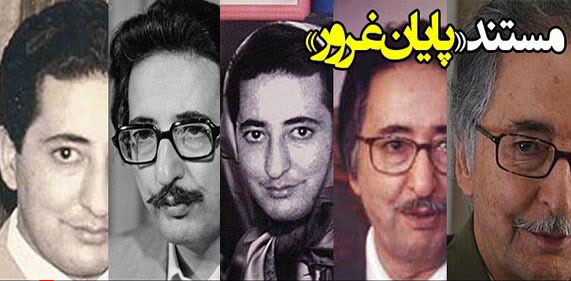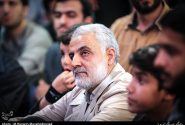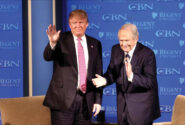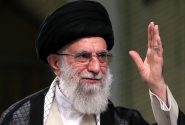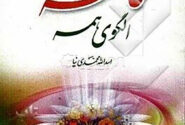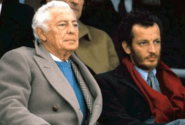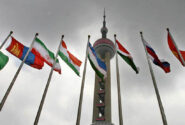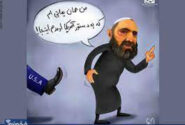Bani Sadr thought he was a king rather than a president
Therefore, he wanted all the legal institutions of the system to come under his command
And he can warn those who work against his will and even prevent their activities
The last days of June 1360 were the days of life and death for a man who was the first president of Islamic Iran until a few months ago.
Abolhassan Bani Sadr is the first president in the history of Iran and this title makes one proud, but not so much that he falls so that he cannot stand up!
Who was Abul Hasan Bani Sadr and what happened? A question that has been asked by many and there are clear answers to it.
History, with all its complexities, is simple and easy. If you keep up with history, you will see how civilizations have emerged, grown and reached perfection, and finally, by losing the components of growth, they have fallen!
Humans also follow this rule. They emerge in the world of society and politics, some grow and flourish, and others after growing and flourishing, reach the peak of power and prestige and finally experience a fall. But in this midst there are other people who never fall and when they leave this earthly world, they experience a higher world with martyrdom!
Bani Sadr is one of the first group of people, and the great martyrs Rajai, Beheshti and Chamran are from the second group. The group that Imam Khomeini advised everyone to die like Chamran one day after removing Bani Sadr from the presidency, and to die like Chamran, it is necessary to live like Chamran.
Let’s skip this introduction and get to the main question of our article
Who was Bani Sadr and how did he appear and fall?!
Abul Hasan Bani Sadr was born on the second day of April 1312 in Baghcheh, Hamedan. He studied in Hamadan and Tehran and spent his childhood in this city until he received his high school diploma.
| Over time, the dimensions of narcissism and personality cult of Bani Sadr became the basis for arrogant relations with other officials of the system. In an interview with the newspaper, he said, “I am the greatest thinker of contemporary times.” I consider this contrast and monotheism to be the greatest work of the century, which is my own.” |
|---|
He grew up in a clerical family and his father was one of the famous clerics of Hamadan. But according to him, the atmosphere in his family was completely anti-mogul. (1)
This negative view and fear of forcing his father to learn seminary courses caused him to struggle in the field of learning new sciences. Besides this, he was not oblivious to political issues and was more or less aware of the events of the day.
During his student days, he first became interested in Mozaffar Baghai’s “Zahmtakshan” party, but during the American coup d’état on August 28, he was attracted to the National Front. (2)
After receiving his bachelor’s degree, Bani Sadr started his work at the Ehsan Naraghi Social Science Research Institute and married one of his fellow citizens during these days.
Nationalization movement of the oil industry and the arrest of Bani Sadr
During the nationalization movement of the oil industry, he was arrested twice and spent a short time in prison. After the suppression of the uprising on June 15, 1342 and the dissolution of the Second National Front, Abul Hassan Bani Sadr went to France and continued his activities there under the title of the Third National Front.
But it didn’t take long to find strong differences with the confederation of foreign students, and as a result of these conflicts, first the Third National Front and then the confederation disintegrated.
He, who was away from political activities in the early years of the 50s and sometimes together with Dr. Naghizadeh published the “Newsletter of the National Front” in England, he gradually came close to the Union of Islamic Student Associations in Europe and a new round in The political life of Bani Sadr began.
When the revolutionary movement of the Iranian people intensified, the relations of Bani Sadr with the revolutionaries and followers of the Imam became closer.
During the imprisonment of Ayat Taleghani and Montazeri and the martyrdom of Ayatollah Saeedi, some of the fighters, including Mohammad Montazeri, Mohammad Gharegi and Mohammad Ali Hadi, who were in France at that time, went on a hunger strike in Saint Mary’s Church. Bani Sadr played a role alongside these fighters and explained the positive aspects of this protest movement to the French and human rights activists together with Salamian, Soudabe Sedifi and Ahmed Ghazanfarpour.
Two selfish people and one climate!
At that time, Sadegh Qutbzadeh had become famous in Paris due to his extensive relations in the media field and he had a good relationship with the fighters of the revolution and national and religious figures, but both Bani Sadr and Qutbzadeh did not have the patience to cooperate and tolerate each other and that One accused the other of personality cult and this story continued until the Islamic Revolution and events after the establishment of the regime.
| Bani Sadr came to Iran in the company of the Imam and with the flight of the revolution and from the very beginning he presented himself as an intellectual in line with the revolution and the Imam, and an expert in Islamic economics. His education and scientific background, self-confidence and verbal skills made him capable of winning the votes and minds of the people. |
|---|
These differences remained until the news came that Imam is planning to travel to France. This issue caused a difference of opinion among the revolutionary forces living in Paris.
Opposition to Imam’s migration to Paris
Bani Sadr was opposed to the Imam’s coming to Paris and cited reasons for this opposition; First, he said that they are an imitation authority, and if they come to a western country, they will not find a good side among the religious people of Iran and the region. Second, he did not want the imam to witness the differences between the intellectuals and national and religious forces, and he insisted that the imam choose Syria to stay. (3)
Finally, the Imam decided to travel to Paris, and during his stay in France, some revolutionaries and intellectuals, including Bani Sadr, became more connected with the Imam.
Forward to power!
At the same time when the Imam returned to Iran on 12 Bahman 1357, Bani Sadr was among those who accompanied him on this trip. At that time, he was an unknown figure to the people; But three days after his arrival in Iran, he gave a series of lectures at Sharif University of Technology that lasted for ten days.
From now on, many people knew him as a religious intellectual who tries to establish a link with the civilized world of the West by using Quranic and Islamic concepts and themes.

Bani Sadr’s debate with Babak Zahrai, one of the leaders of the Maoist group known as Revolutionary Workers, also showed a successful face of him, and the subject of his membership in the Revolutionary Council was gradually brought up, and with the confirmation of this issue, Bani Sadr made his way to the front pages of newspapers and placed He firmly established his foot in the media.
During this period, he was known to many as someone who apparently thought of an ideological solution based on Islam. Especially since at that time he had written many articles and books in this field, such as the economy of monotheism, personality cult, hundred articles about the Islamic Republic, etc.
| Ayatollah Khamenei listed 14 reasons for Bani Sadr’s political inadequacy. Disrespecting legal institutions, not respecting the sanctity of the republic and the president, using any means to deal with the opposition, politics instead of truth, the president not being honest and truthful, etc. |
|---|
At this point, he was one of the harsh critics of the interim government’s cabinet, and he was a staunch defender of the nationalization of banks and the interest-free economy in the economic structure. On the other hand, he had the experience of being in the Ministry of Economy and Finance and Foreign Affairs.
All these factors made him known as one of the leading figures for the first presidential election; Especially, before this idea was raised, he established and launched the newspaper “Islamic Revolution” – with the aim of serving the revolution – which practically became his propaganda spokesman during the elections and during his presidency.
Unrivaled candidate
On January 4, 1358, Kayhan mentioned Bani Sadr, Qutbzadeh, Bazargan and Gholam Hossein Sediq (from the National Front forces) as candidates for the presidential elections.
Abolhassan Bani Sadr, the Minister of Economy and Finance, also implied in these days that he will officially start election activities within the next few days.
Finally, with the market of election slogans heating up, Bani Sadr listed his most important programs as national unity, economic reconstruction, security and spirituality.
On January 25, 1358, the possibility of Jalaluddin Farsi’s resignation was raised due to the suspicion of the constitution and his non-Iranian origin. This issue faced the Islamic Republic Party with a difficult situation.
On the one hand, they saw that their main electoral rival, Bani Sadr, has wide support, and on the other hand, they did not think they could choose a suitable alternative for Farsi.

The first president of Iran
Finally, on the 5th of Bahman 1358, the first round of presidential elections was held and people went to the polls to elect the head of the executive branch, and Bani Sadr won the presidency with 11 million votes. (4)
An advice that I wish was heard!
On February 15, 1958, nearly ten days after the election, Imam Khomeini executed the verdict of the people’s election and Bani Sadr officially became the president of Iran.
| After the judiciary investigated the case of Tehran University incident on March 14th, pro-presidential groups were introduced as the defendants of March 14th incident due to provocative actions and carrying weapons. |
|---|
But what the first president did in the implementation of the decree before other cases and it was evident is the advice that Imam Khomeini spoke to Bani Sadr that day, and I wish Bani Sadr would have listened to this advice!
On this day, Imam Khomeini addressed Bani Sadr in the presence of members of the Revolutionary Council, the president-elect and a group of journalists. I would like to mention one word to Mr. Bani Sadr, which is a word of warning for everyone: “The love of the world is the root of all sin” Every position that is achieved for humans, whether spiritual positions or material positions, will be taken one day, and that day is also unknown.
He continued: I ask Mr. Bani Sadr that there should be no difference between his morals before and after the presidency. Being different is the reason for the weakness of the ego. (5)
Indeed, how did the Imam know that Bani Sadr is not worthy of this position and there will be many differences between him today and tomorrow, that at the beginning of his work, they advise the first president and warn him about the future!

Bani Sadr’s first words after the ban
Anyway, Bani Sadr becomes the president. The first words of a president are very important because this speech shows how the elected of the nation thinks and what he will do.
After the recitation of the Imam’s ruling by Seyyed Ahmad Khomeini, Bani Sadr said: The Islamic revolution of the Iranian nation does not mean a renaissance, rebirth or new birth to dominate material knowledge over an economic system alone, this revolution is for the elevation of man and for the manifestation of a new humanity that in this century called Islam and under the leadership of our religious leaders. is done
Bani Sadr continues: What honor is it for us when we inherit an impoverished society and we want to continue happily with titles that have no content. Presidency, ministry, and what is it for? If it does not serve the people.
Imam’s merit is unique in history
Bani Sadr also says: The merit of each person depends on his ability to attract cooperation, the merit of the Imam is definitely, if not unique, in our history, it is certainly very rare, and I say without a doubt, as a son of Imam, that perhaps It is unique that a person was able to ask a nation to cooperate. These merits should be found in us too.
| Bani Sadr, who did not see the Majlis completely under his control, tried not only to create a psychological war and resist some decisions of the Islamic forces, but also to push his opposition to them in the public space of the society and put his opponents in front of the people. |
|---|
I have not been chosen to be like a king in creating discord
He continues: Our people don’t believe that they should unite to win and overcome problems, our religious or political leaders, military commanders, need to fight day and night so that it can be said that they have gained dignity, this is the view of a human being. is not. The vision of a human being is that authority is in cooperation.
Bani Sadr says: I was not elected as the first president to follow the Shah’s method in creating differences in the country and to be the embodiment of clashes and differences, conflicts between groups, strata and individuals, but I was elected with the knowledge and vision of Islam and the knowledge and vision of the revolution. to be the axis of the country’s unity.
The first duty of the president is to create understanding
Enumerating the first duties of the president, he also says: My first duty is to try to create understanding, I have worked hard in this field in the past, and I pledge and assure you to create this environment of understanding for everyone in Iran. I will provide. (6)
Bani Sadr talks about the first duty of the president and says that my duty is to create understanding, he says that I did not become president to create differences between people like the king. Bani Sadr pledges to create understanding between people and groups and…
Is it like this?! The truth is that right from the day of implementation, Bani Sadr ignites the fire of disputes, gets involved with the legal institutions of the country, including the parliament and the judiciary, condemns them to tyranny and says that everyone should be with me as the president. The elected people should be coordinated, he does the opposite of what he says and it is as if he is not the one who uttered these words.
| The Bani Sadr group always tried to introduce the opposite current, namely Hezbollah and the defenders of values and religion, as adventurous, violent, extremist, stick-wielding, illogical and pro-tyranny people, and on the other hand, they presented themselves as people of logic, dialogue, Discourse and supporters of freedom of speech and opinion! |
|---|
A look at Bani Sadr’s first day’s speech and comparing it with his performance during one year and a half of the presidency, shows that Bani Sadr has stepped in the opposite direction of creating understanding among the people.
Step by step towards tyranny; Trying to conquer the parliament!
In any case, Bani Sadr became the president, and in this situation, the first Islamic Council, which was called the National Council at that time, should also be formed, so that the president can officially begin his work by taking an oath in front of the representatives of the nation.
Since, according to the constitution, the president was considered a ceremonial official and the parliament had to give a vote of confidence to the prime minister, the election of parliamentarians was of great importance. Therefore, many wanted to make the parliament aligned with them.
Bani Sadr, who had just become the first president of Iran, knowing that if the next parliament does not agree with him, he will face many hardships and his long-term plans will be ruined, he spoke about this from the very first day. that the parliament must agree with the president.
In one of his speeches, Bani Sadr says: The parliament that will be formed in the future must be in accordance with the plans and opinions based on which the presidential election was conducted. In this speech, he criticized those who think that whoever rides in Iran will stay riding until the end. (7)
A few weeks later, in an interview with Algiers TV, Bani Sadr said: If our parliament, whose elections will start in a few weeks, is coordinated and wants the same reforms that the Iranian people demand, this parliament itself will become a strong point. But if the parliament is against the line on which the president was elected, or is scattered or does not have a fixed majority, this parliament will become a great weakness. (8)
In another conversation, he says with exemplary pride: I am the first person in human history who has reached the presidency with such a majority, no president has reached the presidency with such a majority until now. He also said: People should vote for the representatives in proportion to their vote for the presidency, and if the parliament is not in harmony [with the government], Iran will explode. (9)
With these words, Bani Sadr lays the first stone of dictatorship, while the representatives of the Islamic Council must be elected by the people, and it is natural that the direction of the parliament also depends on the people’s vote. Bani Sadr says that the parliament should be in the same direction as the president and move in line with the government’s plans!

Bani Sadr; Pendragon
Following the election of Bani Sadr by the people as the first president, Imam Khomeini appointed him as the commander in chief of the armed forces so that Bani Sadr would not have an excuse for not doing enough or that no one would cooperate with him. do
| Bani Sadr gradually went further and in addition to claiming the coordination of other forces with him, he also assumed the role of the coordinator of the three forces and in a letter to Ayatollah Shahabuddin Eshraqi, his representative in the dispute resolution board, wrote: According to Article 113 of the Constitution, the role of coordinating the three powers is my right. |
|---|
In a part of Imam Khomeini’s ruling on 30th of Bahman 1358, it was stated in this context: At this critical stage, where the need to concentrate forces is greater than any stage, Your Excellency, on my behalf, to the position of Commander-in-Chief of the Armed Forces in the order determined by the Constitution of the Islamic Republic of Iran. has done, you will be appointed. (10)
But Bani Sadr had a different idea about this position. He thought that now that the Imam has entrusted him with the command of the general forces, all the matters related to the leadership are under his control, so when Imam Dua’i was appointed to be the head of the newspaper, he also gave a ruling on the Imam’s order to say May it be in my possession! (11)
Anyway, Bani Sadr during his command in the armed forces, in addition to pushing these forces towards becoming politicized and thus away from the main goal of war, he also commits other violations, such as with the beginning of the imposed war. Iran faced the action and lost a lot of land in the first months of the war.
Ayatollah Khamenei, the supreme leader of the revolution, in his historic sermons on June 29, 1360, mentioned this issue and said: Nearly seven months before the war, you were the commander-in-chief. Why couldn’t our military forces resist when the war started? Your imam was chosen as the commander in chief on the first of March 1358, on the first of Mehr 1359, that is, seven months after you were the commander of the forces, the war started. What were you doing during these seven months? Why didn’t you restore the army? Why didn’t you train the military? Who should have done this? Apart from Mr. Bani Sadr? Why do you blame this and that when the war starts and the failure of your work in the last seven months is revealed?
Ayatollah Khamenei continues in another part of this memorable sermon, which was delivered shortly before the removal of Bani Sadr from the presidency: When they ask him, why haven’t you organized the army? they say: Because other people have interfered in the army, they mean the revolutionary courts in the army. Because they had arrested the people accused of the coup. Mr. Bani Sadr expected that there would be a coup in the army against the Islamic Republic and that the coup plotters would be released and not arrested.
So what are these courts for? If this court leaves the hands of the conspirators free, the future generations will not spit on those involved that you discovered the conspiracy and knew the elements, but did not prosecute? Mr. Bani Sadr expected good and bad people to be equal in the army, this is a big sin. I am asking you, Mr. Bani Sadr, what did you do when you became the commander-in-chief in March 1358? How were you when the coup plotting started on March 15th? So you are responsible. (12)
| Based on an exclusivist understanding of Article 113 of the Constitution, Bani Sadr considered himself superior to all the three powers and believed that the three powers should work under his supervision and in cases where there is a difference between the three powers, the opinion The president will be the criterion. |
|---|
There is a lot to be said in the field of Bani Sadr’s management during the war, which we will pass on and discuss his other actions.
The first great crisis; Who will be the prime minister?!
Finally, after two months, on August 1, 1359, the approval of the credentials of the representatives ends, and on the same date, the president officially took the oath.
From this day, everyone was waiting for Bani Sadr to introduce the Prime Minister within the next day or two, and in this way, the institutions of the Islamic Republic stipulated in the constitution would be formed and completed.
At this stage, Bani Sadr, in a deceptive act, in a letter to the leader of the revolution, introduces Seyyed Ahmad Khomeini for the position of prime minister. (13) In the hope that he will get rid of the Prime Minister nominated by the Islamic Republic Party, that is, Jalaluddin Farsi, or in case of possible opposition from the representatives of the nation, he will focus on the dispute between the Majlis and the Imam’s House. But Hazrat Ruhollah opposes Bani Sadr’s proposal with exemplary intelligence. (14)
In the second step, Bani Sadr wants to introduce Mustafa Mirslim as the prime minister, but this time the opinion of the parliament is also negative.
Anyway, after many ups and downs, Abolhassan Bani Sadr introduced Mohammad Ali Rajaee as the prime minister to the parliament based on the agreement.
Mohammad Ali Rajaei explains the company and the process of forming the cabinet in a television program on 10 Shahrivar 1359.
“After these cases, one of the brothers was introduced to the parliament, but it was not approved, we wrote a letter, our brother Mr. Bani Sadr came to the parliament, we raised the issue in a closed meeting, and Mr. Bani Sadr also spoke, and the parliament also The proposals they made asked for help in determining the criteria for a prime minister that the parliament would like.
As we know, this group was immediately elected after the visit of Mr. President and 5 people were elected and one person was decided to be sent by Mr. President. Mr. President, out of those 5 people, 2 people said that they should leave, as they have already given their opinion, and the parliament left those two people in order to show more cooperation. In the end, three people from the parliament and one person from each other on behalf of Mr. President started to check the qualification and necessary criteria in a person to be chosen as the prime minister.
This delegation introduces 4 people to Bani Sadr as qualified to hold the position of Prime Minister, but Bani Sadr absolutely opposes the three options. “Finally, 4 people were introduced to Mr. Bani Sadr and Mr. President said that I absolutely do not agree with three of them and rather I express my opposition, but with one of them I have no so-called individual opposition, in terms of their characteristics. The person he should be, I see these qualities in him, but in terms of running the country and the line that should be followed, I don’t see him as competent.

All Bani Sadr’s criticisms of Rajaei / are secretive and decisive!
Rajaee continues like this: “In their criticisms of me, everyone knows that they said that Mr. Rajaei is such and such, but he is a secretive person. He does what he thinks, even if it is proven otherwise than what he thinks. “Mr. Bani Sadr did not agree with the responsibility of my servant over the Ministry of Education.”
| Bani Sadr, in a deceptive move, in a letter to the leader of the revolution, nominated Seyyed Ahmad Khomeini for the post of prime minister. In the hope that he will get rid of the Prime Minister nominated by the Islamic Republic Party or, in case of possible opposition from the representatives of the nation, he will focus on the dispute between the Majlis and the House of Imams. |
|---|
Bani Sadr does not accept Rajai’s prime ministership and the parliament also announces that the president will nominate whoever he wants as the prime minister and the parliament will vote based on the criteria.
After announcing the opinion of the delegation and according to Shahid Rajaei, “the president said you should go to the parliament and see what the opinion of the representatives is. If the majority of the representatives are of the opinion of Rajaei, I will remain silent about the differences I have with him.” Well, this delegation also returned to the parliament for voting. Voting was held in a closed meeting and the votes they gave were remarkable for me. We informed the issue to Mr. Bani Sadr and the president said very well, I will introduce him and I will remain silent about the differences I have and will not say anything.
As the opinion of the parliament became clear that no one but Muhammad Ali Rajaei will be able to win the vote of confidence of the representatives, Bani Sadr introduced Rajaei as the prime minister to the parliament in a letter.
Although he had announced that he would remain silent about his differences with Mohammad Ali Rajaei and would not take any action to destroy the cabinet, Bani Sadr has not failed to make any efforts to bring down the government for nearly a year and has repeatedly called that this government has imposed on the president, prevented the formation and completion of the cabinet. Until the day of Bani Sadr’s removal from the presidency, Shahid Rajaei’s cabinet did not have a foreign minister, and to solve this problem, the parliament was forced to approve a law so that the administration of ministries without ministers is the responsibility of the prime minister, but Bani Sadr this time also He refused to sign the law approved by the parliament and approved by the Guardian Council and prevented the completion of the cabinet.
The president who did not accept others / Bani Sadr’s attack on the legislative and judiciary!
As it was mentioned, since he knew that the next parliament would play an important role in the formation of the cabinet and many other matters, Bani Sadr tried to control the first parliament after the revolution.
Bani Sadr many times and with various excuses, other institutions of the Islamic Republic, from the parliament to the judiciary and the government elected by the parliament, were considered illegal and demanded the dissolution of these institutions.
These interferences spread until June 2, 1960, in an open letter to the Supreme Judicial Council, Bani Sadr protested against the change of positions of some officials and judges.
In this letter, according to the old tradition and by abusing the Constitution, he wrote, “According to the responsibility that I have under Article 113 of the Constitution, I inevitably warn once again that the procedure of the Supreme Judicial Council violates the Constitution and defames and violates The independence of judicial authorities will weaken the judiciary and deprive it of judicial security.” (15)
| Bani Sadr, during his command of the armed forces, in addition to pushing these forces towards politicization and thus away from the main goal of war, also commits other violations. |
|---|
Based on an exclusivist understanding of Article 113 of the Constitution, Bani Sadr considered himself superior to all the three powers and believed that the three powers should work under his supervision and in cases where there is ambiguity in the law or between the three powers. If there is a difference, the president’s opinion will be the criterion.
But Shahid Beheshti emphasized in an interview in response to such illogical perceptions of Bani Sadr: As he (Bani Sadr) has said in his record, speeches and interviews, he believes that the Majlis and the Supreme Judicial Council should align themselves with him, therefore, in relation to the presidency and its role, they have an impression that the Majlis and the Supreme Judicial Council The judiciary and especially the Guardian Council and in general those who drafted the constitution in the Assembly of Experts do not have such an opinion.
Fortunately, these issues have clear solutions, the duties and powers of the president are specified in the constitution, and wherever detailed explanations are necessary, the general points should be clarified through the detailed laws approved by the Islamic Council, and wherever in terms of compliance with The Constitution faced ambiguity, the Guardian Council must give an opinion, and in this regard, neither the opinion of the president nor others are the criteria. Wherever their opinions are in conflict with the Majlis in their understanding and interpretation of the Constitution, according to the Constitution, the Guardian Council’s decision is final and they or the Majlis should no longer interfere with their decision. This is the clear statement of the Imam of the Ummah. (16)
Bani Sadr gradually went further and in addition to claiming the coordination of other forces with him, he also assumed the role of the coordinator of the three forces and in a letter to Ayatollah Shahabuddin Eshraqi, his representative in the dispute resolution board, wrote: “According to Article 113 of the Constitution, the role of coordinating the three powers is my right, I have the right to warn and warn the Constitution about this.”
Martyr Dr. Beheshti responded to these statements as follows: “The constitution does not say that the president is the coordinator, but the relationship between the three powers is established by the president, that is, when the legislature wants to pass a law to the government, it passes it through the president. As stated in Article 113 of the Constitution, when the parliament wants to pass a law and notify it to the judiciary, it is given to the president to sign, it is given to the government board, and it comes to the judiciary through the minister of justice. . Therefore, the issue is the issue of communication and regulation of relations, which he and some others have turned into a coordinating word that is not in the constitution. (17)
Yes! Bani Sadr thought that he was a king rather than a president because of this wrong understanding of the constitution and because of his power-seeking spirit! Therefore, he wanted all the legal institutions of the system to come under his command and be able to warn those who work against his wishes and even be able to prevent their activity as an activity against the constitution. (18)
A weapon called a stick!
The Bani Sadr group always tried to introduce the opposite current, namely Hezbollah and the defenders of values and religion, as adventurous, violent, extremist, stick-wielding, illogical and pro-tyranny people, and on the other hand, they presented themselves as people of logic, dialogue, Discourse and supporters of freedom of speech and opinion!
Having more than 50 newspapers and weekly newspapers, this group tried to incite public opinion against the pro-Islamic thought process and values. Bani Sadr, along with the National Front and Azadi Movement parties and leftist and mass groups, attacked the defenders of pure Islam. He set a goal and did not spare any efforts in this way.
While he repeated this in every speech and mocked the supporters of the Islamic system, he said: “Every word we say, take a club and hit the side that is wrong!” After all, where are such things in our school? The Qur’an says that until you reach it, hit it on the head with a club and say, “Merhamat hai”?! This is what makes us weak and dumb and creates fear, and this fear is more than the fear of Savak sticks, and the result is that our young people do not pursue action, knowledge and thinking”. (19)
| Bani Sadr said in an interview, “I am the first person in the history of mankind who has been elected president with such a majority, no president has ever been elected president with such a majority.” |
|---|
Bani Sadr and his like-minded people tried to use lies and slander to introduce the supporters of the regime as club wielders who do not even hesitate to break and destroy mosques. Pay attention to this news:
“At the invitation of the Office of Coordination of People’s Cooperation with the President, Professor Sheikh Ali Tehrani was invited to the Arg Mosque to give a speech on the current issues of the country. They suddenly attacked and insulted Professor Ali Tehrani. The small group with clubs beat several people and broke the mosque’s windows and were looking for conflict and chaos. These people, who did not exceed 20 people, tried to enter the mosque with slogans of death to the hypocrites, greetings to heaven, the helper of the oppressed.” (20)
After that, Bani Sadr tried to identify Martyr Beheshti and the Islamic Republic Party as the cause of the riots in the headline of the Islamic Revolution newspaper’s article titled “Chub carrying is condemned”. He wrote:
“Two years of guidance and guidance, and finally guidance and warning, could not stop the stick-wielding, could not convince the stick-wielders that the country cannot be run with a stick, could not convince the stick-wielders that the right way to deal with the opposition is free discussion and not the stick. , and worst of all, he could not force them, who are the responsible authorities and are obliged to maintain the judicial order and security of the people, to perform their duties decisively and urgently” (21).
Bani Sadr also said in his speech on March 14, 1959 with a very humbled expression: “I prefer to be killed today by the hands of club-wielding criminals, rather that the custom of club-wielding be destroyed in this country.” (22)
The slogans that were chanted in the presence of Bani Sadr during the 14th of March ceremony were mainly aimed at the religious section of the society and the Islamic Republic Party and the true companions of the Imam such as Shahid Beheshti.

Controversial speeches from September 17 to March 14!
After the victory of Bani Sadr in the presidential elections, which was achieved after his main rivals withdrew, the elections of the first term of the Islamic Council were held and the Islamic movement was able to achieve significant success in these elections.
Bani Sadr, who did not see the Majlis completely under his control, tried not only to create a psychological war and resist some decisions of the Islamic forces, but also to push his opposition to them in the public space of the society and put his opponents in front of the people.
| Bani Sadr, who had now become the first president of Iran, spoke from the very first day that the parliament should agree with the president. |
|---|
In this work, he relied on his high votes in his election to the presidency and facilities such as his newspaper.
One of Bani Sadr’s strategies to achieve this purpose was the tension-provoking speeches in public places, which were done by informing and inviting the people, and their reflection was fueled in the Islamic Revolution newspaper and some publications aligned with the president. .
The speeches of the beginning of August, 17 Shahrivar (23), Ashura (24), 22 Bahman (25) and finally 14 March (26) of this year should be evaluated in this regard.
The dispute resolution board and the president who did not accept the opinion of his representative!
Imam Khomeini, after the uproar on 14th of Esfand and the issues after that, issued an order to follow up and deal with this matter, and the judicial proceedings on the case of 14th of Esfand started on the 16th of Esfand of this year, and ten investigative judges investigated until the beginning of June 1360. They worked extensively in this field.
After the judicial branch’s long investigation into the case of the Tehran University incident on March 14 and the collection of criminal evidence in this regard, some of the results obtained from this investigation were announced, and the pro-presidential groups were charged with provocative actions and carrying weapons, as The accused of the 14th of March incident were introduced.
Also, due to the fact that crimes had been announced against the president himself, an investigation was also conducted in this regard, and there were sufficient reasons for his guilt in cases such as abuse of power, violation of legal authority, incitement of the people, support of rebels and groups. He was found armed.
Following the investigation of the incident at the university and the seizure of “Mizan” newspaper, and then the court’s decision to lift the seizure of this newspaper, Bani Sadr and the Islamic Revolution newspaper started a commotion about the lack of justice in the courts.
Despite all the problems, this case went through its completion stages and enough evidence was obtained about the accusations of the criminals and it was ready to be submitted to the court; But at this stage, the judicial follow-up was stopped in some ways and the case did not go to court. The presence of Dr. Beheshti, who was the head of the Supreme Court in those days and was at the head of the judicial courts, was one of the problems ahead.
| A look at the words of Bani Sadr on the first day, who said that the duty of the president is to create understanding, and comparing it with his performance during one year and a half of his presidency, shows that Bani Sadr has stepped in the opposite direction of creating understanding among the people. |
|---|
Bani Sadr considered the judicial proceedings under his supervision to be biased and claimed that he should be tried like others, so he filed a lawsuit against Ayatollah Beheshti. (27)
On the other hand, on March 25, 1359, according to the incident of March 14, Imam ordered the formation of a three-member committee to deal with the disputes.
According to this decree, “to deal with complaints about war issues and other disputed issues between the authorities of the Islamic Republic, a committee will be appointed, consisting of one representative from the president, one from the other side, and one from me, who will try to resolve the complaints.” representative and the majority vote of the aforementioned board is valid; And in case of a violation by one of the officials, the offender should be introduced to the people and he should be impeached.” (28)
Bani Sadr chose and nominated Ayatollah Ishraqi as his representative in that delegation, and Imam Khomeini nominated Ayatollah Mahdavi Keni as his representative, and Ayatollah Yazdi was chosen by the heads of the legislative and judicial branches to be a member of this delegation. became.
After examining the complaints and letters received by Bani Sadr and his supporting newspapers, the board recognized him as a violator and introduced him to the nation. But Bani Sadr did not accept the opinion of the board in which his representative was a member, and this is how the dispute resolution board was dissolved.
Imam’s first practical action; Bani Sadr’s removal from the command of the general forces
Following Bani Sadr’s tension-causing actions, which were increasing day by day, Imam Khomeini removed Bani Sadr from the General Command of the Armed Forces on June 20, 1360. (29)
Bani Sadr is currently in Kermanshah and according to his memoirs that were later published abroad, he was busy planning a coup based on which he would bring the army to Tehran and suppress the opposition!
A few days after this verdict, Imam Khomeini emphasized to the commanders of the three forces of the army, referring to the referendum proposal by Bani Sadr, “It means that they will lose the stability of this country.” That it is stable now and it is one of the honors of this revolution that all these things were fixed within one year. over again!; The votes are the people’s. Well, if it is the number of people’s votes, the people’s votes are what they are.
These did not come from Europe! These are the opinions of these people; These are the people who voted for the parliament, appointed a lawyer; These are the people who voted for the Islamic Republic, and these are the people who voted for the constitution, and these are the people who created everything themselves. Now, what kind of people should we go to again?” (30)
| Imam said on the day of Tanfiz: I would like to mention one word to Mr. Bani Sadr, which is a word of warning for everyone: “The love of the world is the root of all sin” Every position that is achieved for humans, whether spiritual positions or material positions, will be taken one day, and that day is also unknown. |
|---|
One day after these words, the Imam of the Ummah addressed Bani Sadr in the gathering of another group of people while announcing the apostasy of the National Front for announcing demonstrations against revenge.
“If you really want to follow the law, and we also want all of you to come and follow the law, and you came here because of this, and because of this, so that your newspapers and speeches will no longer be for convulsions, did you comply?” By yourself? You came here and agreed that, that is, after you wanted to go to war, it led to a delegation of three people, one person from Mr. President, one person from those gentlemen, and one person from me. I will determine, let these be the rules. After Hakam went and saw and saw the contrary cases and spoke somewhere, it was in their newspapers that this Hakam is like the Hakam of Abu Musa Ash’ari!”
Unsuccessful attempts to return Bani Sadr to the arms of the regime
Time is running out fast for Bani Sadr and Imam still does not want the first president to suffer such a fate. Therefore, Hazrat Ruhollah advises, “I accept repentance even now; Islam accepts. Now they should go on the radio, go on the TV, repent and say that we have made mistakes so far; We made a mistake, we invited people to revolt, it was wrong; It was against Islam, it was against the laws of the country, we confirmed it, we formed an alliance with the hypocrite group. I told this gentleman [Bani Sadr] several times, sir, this crowd will destroy you! These people who have gathered around you, some of them are wolves who will destroy you.” (31)
However, Bani Sadr does not listen to the Imam’s advice until the investigation of the political inadequacy of the first president in the history of Iran enters the agenda of the Islamic Council.
Investigating the political inadequacy of Bani Sadr in the Islamic Council
June 30 and 31, 1360 are two historic and lasting days in the history of the Islamic Republic. In these two days, the political adequacy of the first president of Islamic Iran was discussed in the Islamic Council and a large number of members of the parliament, who had finished their patience after a year of silence, exposed the corruptions and betrayals of Bani Sadr. they paid.
| Bani Sadr’s debate with Babak Zahrai, one of the leaders of the Maoist group of revolutionary workers, also showed a successful face of him, and the subject of his membership in the Revolutionary Council was gradually raised, and with the confirmation of this issue, Bani Sadr made it to the front pages of newspapers and established himself. strengthened in the media. |
|---|
Meanwhile, the historic speech of Ayatollah Khamenei in the meeting on June 31, 1360 is worth reading and listening.
In this speech, Ayatollah Khamenei listed 14 reasons for Bani Sadr’s political inadequacy. These reasons are briefly: Disrespecting legal institutions, not respecting the sanctity of the republic and the president, using any means to confront the opposition, politics instead of truthfulness, the president not being honest and truthful, disrespecting the dignity of the imam and the nation, not respecting the dignity of the republic. Abroad, notorious and dubious advisors, disclosure of the country’s economic secrets, creating tension in the country before the war, disregarding the leadership line of the revolution, moving towards absolute power and tyranny, disruption and rebellion, and unpleasant personal traits, including pride. (32)
Finally, the parliament makes its historic decision and Ayatollah Hashemi Rafsanjani says the following in expressing the result of the deputies’ vote: The total number of people who were present in the parliament was 190 people. 177 people voted in favor of Mr. Bani Sadr’s political inadequacy, one other person voted against it, from now on, Mr. Bani Sadr will be removed from the dictionary of the Islamic Republic of Iran. Slogans should return to America (33).
One day after this decision of the Islamic Council, Imam Khomeini removed Abolhasan Bani Sadr from the presidency and thus the case of the first president in the history of the revolution is closed.

and at the end
One of the famous works of Abolhassan Bani Sadr is a book called “Character Cult”, which deals with the phenomenon of image-making and narcissism of elites in societies. Maybe that day when Bani Sadr was writing this book, he did not think that it would become a prominent symbol of this deviation in Iranian society.
Bani Sadr came to Iran in the company of the Imam and with the flight of the revolution and from the very beginning he presented himself as an intellectual in line with the revolution and the Imam, and an expert in Islamic economics. Considering the accumulation of economic problems in the middle and deprived classes of society, his education and scientific background provided a good opportunity for his election campaigns. On the other hand, his self-confidence and verbal skills made him capable of winning people’s votes and minds.
Over time, the dimensions of narcissism and personality cult of Bani Sadr became the basis for arrogant relations with other officials of the system. Before the elections, he said in an interview with the newspaper “If I were to say who I am, I would introduce myself to you like this: The greatest thought of my contemporary time. I consider this contrast and monotheism to be the greatest work of the century, which is my own.”
| Many people knew Bani Sadr as a religious intellectual who tries to establish a link with the civilized world of the West by using Quranic and Islamic concepts and themes. |
|---|
The supreme leader of the revolution says in a memoir: “Bani Sadr when he was the president. When the late Rajaee entered the room, he did not stand up in front of him. We protested and said why don’t you get up; He said that the president should not get up in front of the prime minister.
Ayatollah Hashemi Rafsanjani also said in a memoir: “Mr. Bani Sadr used to say: I accept ijtihad, but I am the only example of a mujtahid in the world, he said clearly. This is not a joke or joke, with the same number he made, for example, one hundred and sixty-some, and he repeatedly said in the Revolutionary Council: Ijtihad requires this amount of knowledge and only I have this amount.”
I wish! Bani Sadr gratefully listened to Imam Khomeini’s wise advice and did not deprive himself of the moral advice of that wise man.
The most important advice of Hazrat Imam Khomeini in the ceremony of the execution of the presidential decree was to warn against being seduced by apparent officials: “They should note that all those who serve humanity, those who have a position, have a low position, so that their position does not make them proud. It is a place to leave and a person is permanent in the presence of God. I ask Mr. Bani Sadr that there should be no difference in morals between before and after the presidency. Being different is the reason for the weakness of the ego.
I wish Bani Sadr would listen to this advice…
PS:
۱- Lesson of experience, page 43
۲- Lesson of experience, page 57
۳- Imam’s migration from Najaf to Paris according to Ghazanfarpour, Fars news agency , 11/22/85
۴- Bani Sadr’s code name in the CIA was “SD LURE1”, Fars News Agency , October 5, 2017
۵- Imam’s book, volume 12, page 141
۶- Information, 16 February 1358, page 2
۷- Rek Bammad, 7 February 1358, pp. 1 and 3
۸- Information, 28 February 1358, page 12
۹- Information, 23 February 1358, page 9
۱۰- Imam’s book, volume 12, page 157
۱۱- Islamic Revolution newspaper, 21 May 1959, p. 11
۱۲- Information, June 30, 1360, page 12
۱۳- Imam’s book, volume 13, page 56
۱۴- The same
۱۵- Islamic Republic, June 2, 1360, page 3
۱۶- Kayhan newspaper rack, June 21, 1360
۱۷- Kihan newspaper, June 14, 1360, p. 14
۱۸- Rek Bani Sadr and increasing presidential powers, Islamic Revolution Document Center, June 30, 2018
۱۹- Islamic Revolution newspaper, 2 Azar 59, p. 9
۲۰- Islamic Revolution newspaper, March 15, 1959
۲۱- Islamic Revolution newspaper, March 17, 1959
۲۲- Islamic Revolution newspaper, March 16, 1959, first title
۲۳- Information, 18 September 1359, page 15 and 16
۲۴- Information newspaper, November 29, page 12
۲۵- Kihan, 23 February 1359, page 3
۲۶- Islamic Republic, March 16, 1359, page 16
۲۷- Tension-causing speeches, Islamic Revolution Documentation Center, July 1, 2019
۲۸- Imam’s book, volume 14, page 201
۲۹- Imam’s book, volume 14, page 420
۳۰- Imam’s book, volume 14, page 434
۳۱- Imam’s book, volume 14, page 448
۳۲- Detailed discussion of the parliament, June 31, 1360
۳۳- The same





